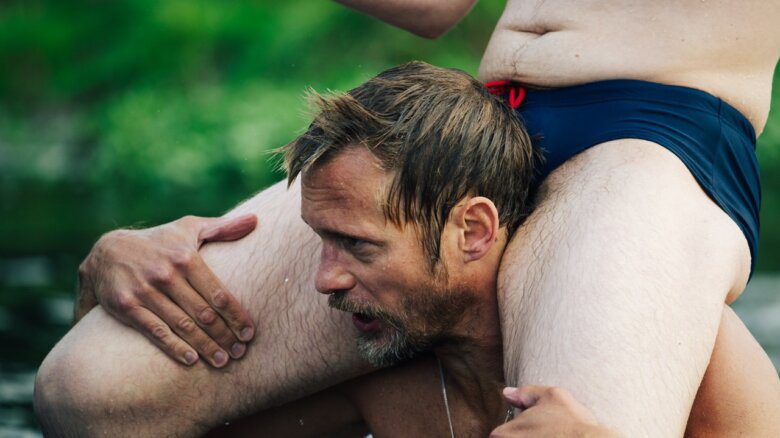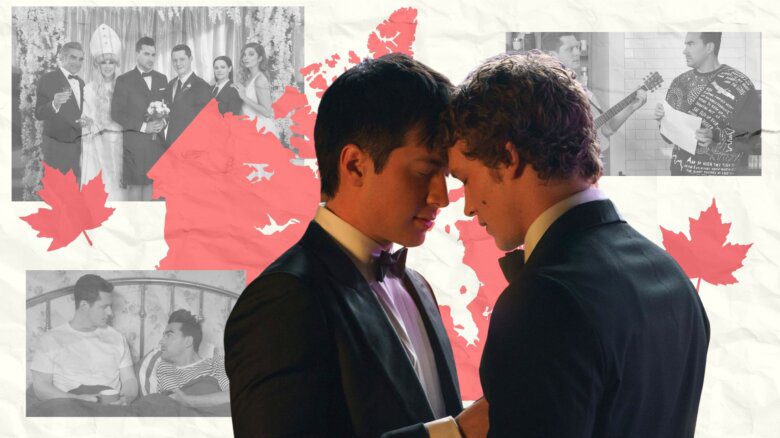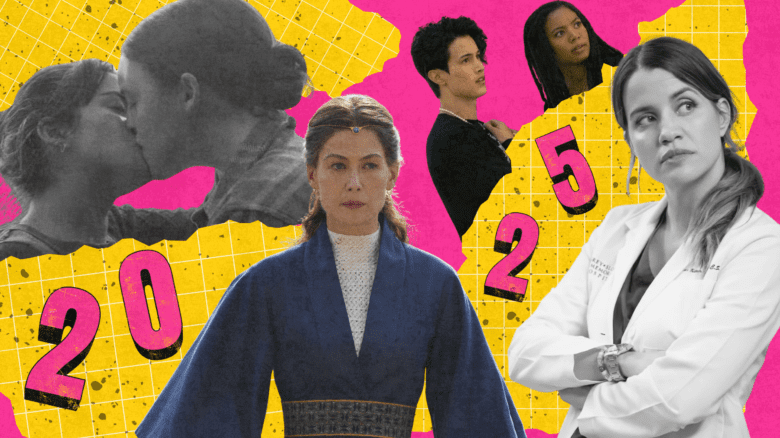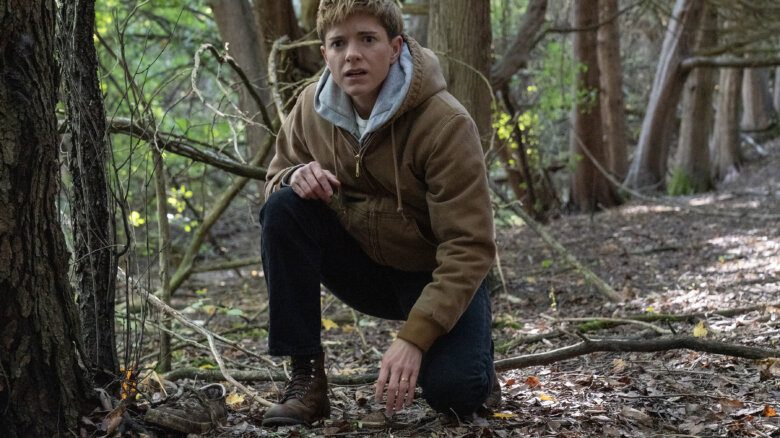When we talk queer icons we’re usually talking about pop stars like Madonna, Rihanna, Beyoncé and Britney, or actresses over 50 like Nicole Kidman, Jean Smart and Viola Davis. But there’s a not-so-new league of gay divas who have ascended to an all-new level of icon status over the last few years: the daytime talk show host.
We’re pointing the finger of blame at social media, namely Gay Twitter, for the way the women of daytime talk have been elevated to the same icon status as pop and movie stars. What makes the queer fascination for daytime talk shows particularly fascinating is just how straight these shows are: The View, Wendy Williams, The Drew Barrymore Show, The Talk, The Kelly Clarkson Show and even Ellen, despite being hosted by an out lesbian, are all targeted at stay-at-home, straight, cisgender mothers. Of course, there’s always been a queer affinity for the strong female personalities of daytime TV—we’ve never met a queer millennial who wasn’t obsessed with The Rosie O’Donnell Show—but what we’re witnessing now is amplified. Today’s women of daytime are provoking the kind of stan wars and queer obsession previously reserved for pop and movie stars.
Part of the current phenomenon of talk show host as gay icon is that, under quarantine, many of us have spent every day of the last 15 months at home. We’ve had time to watch the mom content we’ve never had time to watch before. Furthermore, most of the shows these days put their segments up on YouTube; most of us don’t have cable anymore, and this is our only way to watch what we otherwise would not be able to see. The result is all this content that was created for a very specific, cis hetero demographic being watched by pop-culture-obsessed queers on YouTube. And they’re taking that straight content and queering it by making memes out of the clips and recontextualizing the content on Twitter. The same content can exist in two completely different worlds: the living room of a stay-at-home mom and the deepest corners of Gay Twitter.
“We can count on Meghan to deliver the D-R-A-M-A like no other!”
In this week’s “That’s the Way It Is,” we’re taking a look at what makes the women of daytime so iconic and appealing to queer audiences, and how in the living room of the stay-at-home mom, Meghan McCain is just background noise, but on Gay Twitter she’s napalm.
Thomas: I’m sad to see Meghan leave The View at the end of the month. She is an incredible TV villain for progressives: unapologetic, frank, blonde, the daughter of a saint in the Conservative movement. Because the show is literally about having people with different politics sitting at the same table, the producers had her sit at the far right end of the table! Doesn’t get more literal than that. Even if I disagree with her on most subjects, I have to say I admire how consistent Meghan’s politics are: she is both anti-Trump and anti-squad (AOC and company). We can count on Meghan to deliver the D-R-A-M-A like no other!
I also pay attention to her because I suspect that a lot of white women watching The View found themselves agreeing with Meghan over time. She vehemently criticized the GOP’s MAGA turn, Joy Behar’s suggesting Republicans are the QAnon party and the left’s obsession with socialism. She attacked calls to defund the police, yet admitted to changing her views on racism. I also find it interesting how Meghan can both support same-sex marriage and oppose abortion, which is a contradiction most people on the left can’t even fathom, though it’s probably not that uncommon in younger conservative circles. I’m sure she’s not alone! Whether we like it or not, us queers need to pay attention to the politics of cisgendered, heterosexual white women like Meghan because they have such an important influence on elections. Many of them still supported Trump in 2020 (they did overwhelmingly in 2016). But beyond the politics, it’s Meghan’s total lack of self-awareness as the Arizona Princess that made her a must-watch.
“It’s fascinating to see daytime talk shows, this very straight entity, occupying so much space in queer culture discussions.”
Tranna: I think it’s hilarious that Meghan’s recent hairstyles and makeup looks were dissected in the same way we critique Oscar red carpet looks. I can’t believe we’ve reached a point culturally where we’re talking about Meghan’s looks the same way we talk about the looks of the queens on RuPaul’s Drag Race. Daytime TV has permeated queer culture to a level it never has before—there’s even a brilliant queer podcast called Déjà The View, which discusses and analyzes the wild antics of The View. The two endlessly charming and endearing hosts are obsessed with The View in the same way most queer people are obsessed with Gaga. There are thousands of queer podcasts that discuss pop culture, but it’s usually pop music, film and reality TV. It’s fascinating to see daytime talk shows, this very straight entity, occupying so much space in queer culture discussions. Déjà The View’s Twitter account regularly posts hysterical montage videos that almost always go viral. Many of The View co-hosts, including Meghan herself, have retweeted or responded to their videos, and that’s a huge part of why daytime TV has become such a part of queer internet culture.
Thomas: I wonder if Meghan knows what “camp” is.
Tranna: One of her best friend’s is Clay Aiken—that is camp as fuck. As much as I dislike Meghan, I’m amazed at the way she and all the women of daytime talk put themselves out there. I think there’s a kind of vulnerability required on the part of all talk show hosts. The women of daytime are on TV every single day for an hour, sharing their opinions, sharing their lives. They often say or do the wrong thing and then receive a tidal wave of internet hate. Maybe you need to be a little sadistic to be a daytime TV talk show.
Thomas: To succeed, they have to be interesting. Yes, despite all her flaws, Meghan is interesting in a way failed daytime hosts Kris Jenner or RuPaul will never be. Being a daytime talk show personality is a hard job, even if the people who succeed make it look effortless. That’s probably why we take these shows for granted: they’re always there, until they’re not. It’s also interesting to me that queers seem way more invested in daytime talk shows than late night, a field dominated by straight men.
Tranna: For many queer millennials there’s always been a natural attraction to the world of daytime TV. When I was a kid, there was nothing I loved more than the days I wasn’t feeling well and got to stay home from school. I would literally spend the whole day in front of the TV, watching Jenny Jones, The Price Is Right, The Bold and the Beautiful, As The World Turns, The Young and the Restless and, of course, The Rosie O’Donnell Show, a touchstone for all queer kids of our generation. On her show, Rosie gave us an education by introducing us to so many of the biggest queer icons: Barbra Streisand, Bea Arthur, Aretha Franklin, Liza Minnelli, Bette Midler. Rosie taught us what Broadway is!
Thomas: Being francophone, I didn’t grow up watching Rosie. We had our own queen of daytime: a woman named Claire Lamarche, who became famous for reuniting families who lost touch with each other (way before you could look up relatives on Facebook). I really started to pay more attention to U.S. daytime talk shows in my twenties. That’s when Kelly Ripa transitioned from cute-sy co-host of Live! alongside the late Regis Philbin to be the real star of the show. I liked her energy and drive, and was mostly intrigued by how she made her life with her kids and husband Mark so relatable, even though they’re a millionaire family living in a townhouse on the Upper East Side! The way extremely wealthy people like Ripa act goofy, almost clueless, on television is an endless source of fascination. But what sold me on her was the flock of gays gravitating around her—Anderson Cooper, Andy Cohen and Jake Shears are all in her inner circle. Kelly loves her gays!
Tranna: For so many of us, daytime TV was the first time we saw queer people, where we saw ourselves represented—granted usually not in the best light. I think the first time I saw a trans person was on Maury, during one of his truly disgusting and degrading “Is It a Man or a Woman?” episodes. In 1995, Jenny Jones hosted an episode called “Same Sex Secret Crushes,” where a queer person would confess their crush to the straight object of their affection. Who could have imagined that that would go horribly wrong *eye roll*? Scott Amedure, a gay man who was on that episode, confessed his crush to a man named Jonathan Schmitz. A few days after the taping, before the episode aired, Schmitz murdered Amedure. Such a tragedy.
“The episode mostly focused on closeted Black gay men who were married to women, and referenced gay men contracting HIV and other sexually transmitted diseases.”
The world of daytime TV has always been extremely straight; it was made for straight audiences, and as such it has a long, deeply problematic history of exploiting minorities for entertainment via ridicule. I’ll never forget one of the most deeply problematic The Oprah Winfrey Show episodes about gay men “on the down low.” The episode mostly focused on closeted Black gay men who were married to women, and referenced gay men contracting HIV and other sexually transmitted diseases and passing them onto their wives. I think there is a productive way to have that conversation, but Oprah basically vilified these men, which must have amplified the homophobia of her straight suburban viewers. Oprah, as much as we love her, is not an unproblematic fave!
Thomas: Of course, but I commend her for her willingness to learn and grow. A decade ago, I was off work the week that she wrapped up The Oprah Winfrey Show after 25 years, and I watched the final three episodes as they aired. In the very last one, she just spoke to viewers and the studio audience about what she learned making the show. She shares how the audience became a fundamental part of the show since she started hosting it at age 30. She also spoke about the power of gratitude and love. As cheesy as it sounds, I credit Oprah for helping me realize that I was actually a very bitter gay! I committed to my spiritual growth not long after the show’s finale, I got sober. Gradually, I was turned into the more spiritual side of Oprah (yeah, Super Soul). I credit that Oprah sign-off episode for pushing me to take action and make changes in my life. It’s still one of the most thrilling and enlightening pieces of television I’ve ever watched—I still get goosebumps!
Tranna: Oh my god, that last episode of Oprah is one of the greatest television moments of all time. The cultural influence of Oprah can never be underestimated. A few months ago, I was listening to Titus Burgess on the podcast Talk Easy, and he spoke really poignantly about the way Oprah set the tone for conversation in America and how “every single day at 4 p.m., the sound of her voice meant that all was right with the world and that there would be thoughtful conversation meant for the good of humanity. No matter what you think of her, growing up listening to her interviews and how she treated her guests really sort of set the tone for how I think people should be spoken to and how they should be treated.” I believe, like Titus, that Oprah not being on TV every day is part of the volatility of our current culture. The women of daytime have an immense influence.
Tranna: It’s interesting that the daytime talk show format has survived even as daytime soap operas have died. Maybe that’s because the behind-the-scenes world of the talk shows is even more dramatic than a soap opera. During the last year we’ve seen several talk shows experience major controversy: Sharon Osbourne was fired from The Talk for her racist comments. Watching that play out on social media was just as dramatic as watching a soap opera.
The other big story that emerged in the last year was the toxic work environment at Ellen. As far as headlines go, few are as juicy as “The Queen of Nice is a NIGHTMARE.” It felt like the queer community particularly relished the revelation that Ellen is a horrible person. Why do you think that is?
Thomas: I mean, I used to love Ellen! Her journey from coming out in the 1990s, having her sitcom cancelled and coming back as a daytime talk show host is now an essential chapter of TV history. Of course, it was a real letdown to learn that she and her team let the show become such a toxic workplace. You are right. It definitely stung more because she is the most powerful gay person on television. Yet being queer doesn’t exempt anyone from being a shitty boss. The controversy doesn’t take away from the fact that she opened so many doors to other queer folks. I’m not sure we’d have Schitt’s Creek, RuPaul’s Drag Race or the Ryan Murphy industrial complex without Ellen’s normalizing queer presence on the small screen.
I just rewatched one of the most famous clips from her show, the one where two little British girls, Sophia Grace and Rosie, perform Nicki Minaj’s “Super Bass” after going viral. That was in 2011, the same year that Oprah changed my life and Kelly took over Live!. It’s baffling how much has happened in our culture in the last 10 years. I don’t think something as innocent as two little girls dressed as princesses would be on TV today—we’re less naive than we used to be and so much more cynical.
Ellen is not necessarily responsible for this, but we need to acknowledge that her run on daytime TV from 2003 to 2022 coincides with a profound shift.
Tranna: My favourite talk show host is Wendy Williams. I go through phases where I watch her show every day, then she gets too infuriating and I stop. But I always go back. Her show basically has three segments: “Hot Topics,” a celebrity interview and then either “Ask Wendy” or a tacky shopping segment called “Trendy at Wendy.” But the heart of the show is “Hot Topics,” a term she shamelessly ripped off from The View. Wendy’s “Hot Topics” is a 20-minute segment during which she sits on her purple chair and dissects celebrity gossip. Wendy presents the latest celebrity stories and then shares her opinions. In that time, Wendy has put her foot in her mouth too many times to count, has frequently invented words (clappation = applause), burped a lot and given us moments that became massively widespread memes on Gay Twitter.
Wendy recently had two major viral moments: the first happened when she was discussing Britney Spears’ conservatorship and she wished death upon Britney’s family. When you watch the video, you can see that Wendy shocked even herself by saying it out loud—I think her shock was, “Oh fuck, I’m going to get in trouble with the network.” I thought it was hilarious and it represents what I love most about her: she’s never scared to say what many of us are thinking. Wendy has a dark sense of humour that I personally appreciate. What other talk show host is on the air wishing people death? Even the lunatics at Fox News don’t do that. This is the level of drama I live for.
“We watch Wendy to cringe. Being a Wendy watcher means laughing with her and often at her.”
Her other recent viral moment was particularly bizarre. Wendy shared the news of the murder of a TikToker named Swavy. People online were losing their minds over this video and the way that Wendy talks about Swavy for a full minute in a breezy, upbeat manner before dropping the news of his death, like a bomb going off out of nowhere. It was unhinged and speaks to things I like the least about Wendy: her insensitivity and callousness. Wendy is simultaneously the kind of person who wears their heart on their sleeve and the kind who can be so inconsiderate and tone deaf. But that’s the brand. We watch Wendy for the chaos, the unpredictability. We watch Wendy to cringe, but also because—I think—she is genuinely funny and captivating. Being a Wendy watcher means laughing with her and often at her.
Wendy has been called out for being homophobic and transphobic. I understand why many queer people would not want to watch her. But I don’t personally think she’s either of those things. I think that she’s often just deeply uninformed and out of touch and, again, witnessing those foot-in-mouth moments is what makes Wendy so entertaining. I don’t want Wendy to be “woke.” She is a larger than life personality—she produced her own biopic for Lifetime!—and queer audiences are naturally drawn to that. Part of Wendy’s queer appeal is also her style and wigs. She comes out in a different wig every single day and her outfits range from evening wear to athleisure. In addition to gossip and drama, she is also turning out looks—what more could anyone want?
Thomas: Wendy just doesn’t do high culture, and that’s a problem for me. I love trashy, but sometimes I need Maya Angelou references. What set Oprah in a category of her own was her varied interests and, sadly, I just don’t find that Wendy has enough range to be truly inspirational. (Though I would love to see Wendy launch a book club-type segment where she would discuss works without reading them! That would be very on brand.)
Tranna: I’m surprised that The Drew Barrymore Show has become such a success—it seems like the successor to Ellen. But I honestly can’t handle Drew’s show. When I saw it for the first time, I had no idea what the fuck I was watching. It was truly the strangest talk show I’ve ever seen. Drew is an overwhelming ball of energy: crying, laughing. Every emotion she has is heightened to such an extreme.
However, I would still choose Drew over Kelly Clarkson. Clarkson’s show is also a surprising success and I wish the gays would stop trying to make her a thing. She’s a glorified karaoke singer. I do not enjoy the wholesomeness of Clarkson. Give me the chaos of Wendy, thank you!
Thomas: If The Drew Barrymore Show gave us one thing, it’s the instantly iconic SNL parody with Chloe Fineman. The comedian and impersonator mastered everything you dislike about Drew, and their encounter is as charming as it is chaotic. The show is so bonkers that it even has its own house astrologer, the essential Aliza Kelly. If this is not millennial baiting, I don’t know what is!
Jokes aside, The Drew Barrymore Show contributor Ross Mathews also recently announced his engagement on the show. I know Ross is a polarizing figure in our community, but I just want to acknowledge how terrific it is that a gay man can 1) get married in all 50 states 2) announce his engagement on daytime television 3) have Drew Barrymore shower silver confettis on him. None of these things would have been possible 10 years ago.
And on the subject of Kelly Clarkson, I cannot let you come for her! Yes, Kelly is a karaoke queen (the segment is called Kellyoke), and that’s exactly the point! Find me a daytime talk show host who can belt out Adele, The Cars and Fleetwood Mac, AND do the “Little Bit Alexis” dance with Annie Murphy? I’ll wait.
Tranna: I do not need my daytime queens to be vocalists! I don’t even want that! To me Kelly Clarkson is the Rachael Ray of music. What do you think the future of daytime talk shows is, given the slow death of cable and broadcast TV?
Thomas: As you pointed out, all talk shows (daytime, but also late night) have in recent years heavily pivoted to YouTube, and this is mostly how queer cord-cutters keep up with viral moments. From Oprah to Ellen—and even Kelly, Meghan, Wendy and now Drew and the other Kelly—daytime talk show personalities usually reflect where American culture is at. All of these women have harnessed being outcasts (in some way) and invited people to join them, flaws and all. Daytime talk shows are a celebration of individuality and community; in some ways, we need this more than ever. I just can’t wait for these dumb Zoom audiences to be gone.
Tranna: I really hope that daytime talk TV can lean into queerness more intentionally. I want the producers of these shows to be more aware of the fact that it’s not just stay-at-home moms watching. And I desperately want there to be a queer daytime TV talk show host, even more than I want there to be a queer late night host. I know we still have Ellen, but I feel like Ellen almost doesn’t even count because she appeals to straight people more than she does to queer people. With her imminent departure, I hope we can have a queer host who really celebrates queerness and isn’t trying to exclusively appeal to a heteronormative audience. And I really hope that’s us! Having a daytime talk show is truly my biggest, biggest dream.
Montreal-based comedians Thomas Leblanc and Tranna Wintour’s podcast Chosen Family streams on CBC, Apple and Google; new episodes drop every other Thursday.
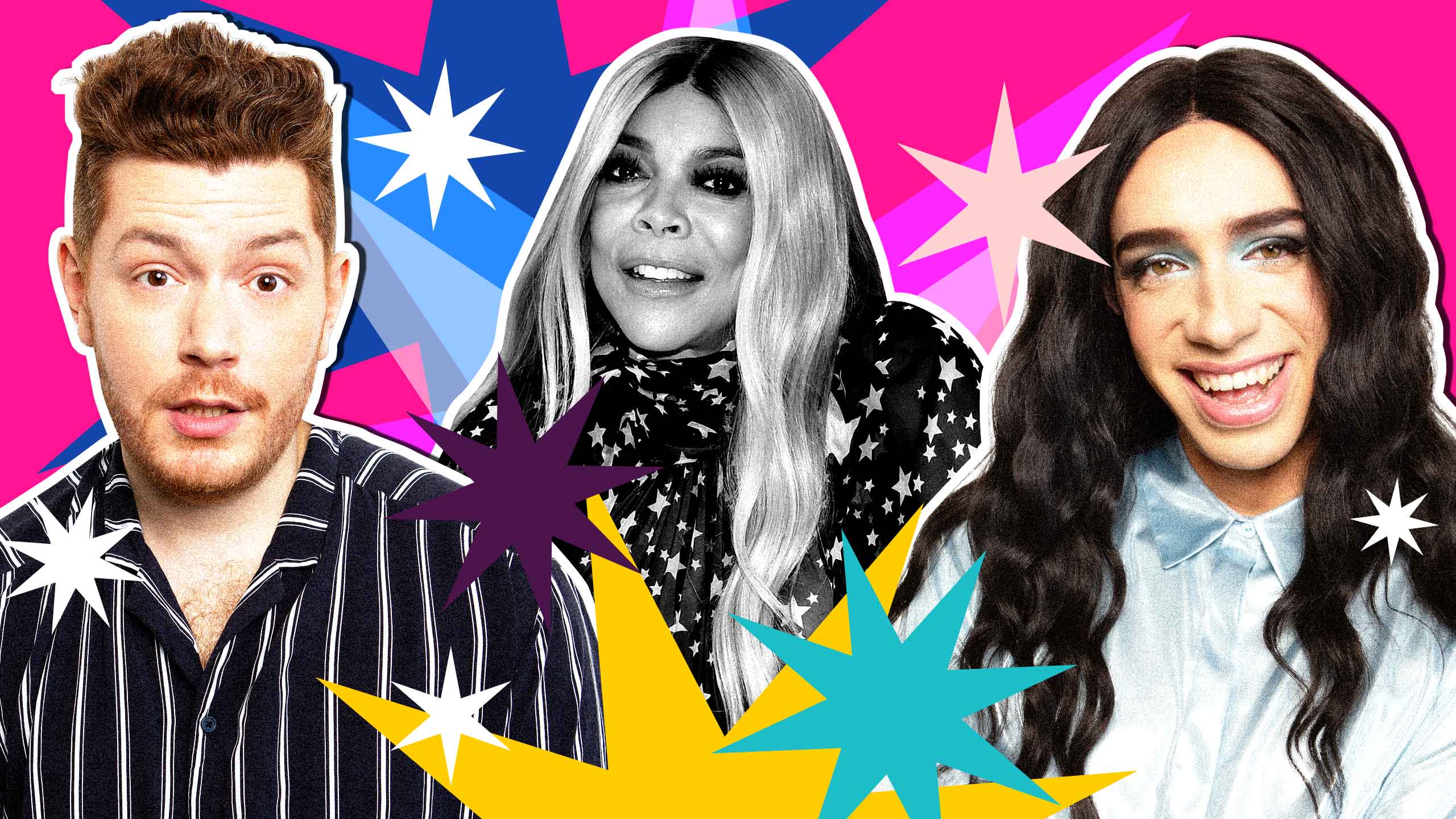
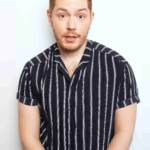
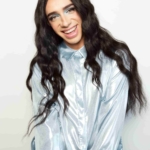
 Why you can trust Xtra
Why you can trust Xtra